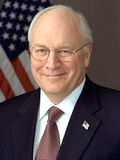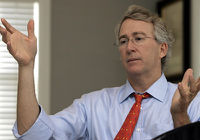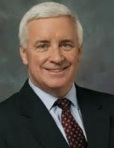Portal:Water/(In)Famous Foes
Dick Cheney: In 2005, the U.S. Congress exempted fracking from regulation under the Safe Water Drinking Act, in what is known as the "Halliburton Loophole." This move was widely perceived as having been pushed forth by Vice President Dick Cheney's Energy Task Force. Cheney is the former CEO of Halliburton, a Houston-based oilfield services company.
T. Boone Pickens: In 2011, Texas oil industry figure T Boone Pickens pushed his Pickens Plan to the National Press Club. His plan was to have U.S. taxpayers pay for billions in government subsidies for vehicles that run on "natural" gas. Launched in July 2008, the plan promotes "energy independence" in the name of "national security." Originally a combination of the promotion of shale gas drilling and wind energy, the plan has transformed into the promotion of gas drilling exclusively. Pickens was influential in the introduction of the 2011 NAT GAS Act. Pickens is also a big proponent of water privitization and owns Mesa Water. He is the owner of the energy hedge fund BP Capital and the author of two autobiographies."
Aubrey McClendon is the CEO of Chesapeake Energy. He is also in the chair of the board of directors of the front group American Clean Skies Foundation. The channel produces what is notoriously known as Branded News. He is also a Managing Partner and Founder of Deep Fork Capital. He has been a Director of Chesapeake Energy Corp. since 1989. At the 2011 winter meeting for the Independent Oil and Gas Association, McClendon stated that Chesapeake planned on investing some $40-50 billion in methane gas drilling in West Virginia in the next few decades. He also stated that Chesapeake had already spent some $600 million in capital investment since 2008 in the state. McClendon received a salary of $21 million in 2010.
Kathryn Klaber: Kathryn Klaber is the President and Executive Director of the Marcellus Shale Coalition (and the former Executive Director of the Pennsylvania Economy League). The coalition fights against environmental protections of areas impacted by shale gas and oil drilling. It is engaged in extensive state and federal lobbying campaigns to protect the financial interests of its corporate members. In an interview with the "Clean Skies TV Network," a channel affiliated with the American Clean Skies Foundation (which is largely funded from profits from gas drilling), Klaber stated that claims of toxins entering peoples' oil wells from fracking are unfounded. This comment was made despite the fact that investigative journalists and scientists have documented the contamination. Klaber also stated that the FRAC Act was unnecessary because the U.S. Environmental Protection Agency already has regulations in place to protect the environment. She neglected to mention that the chemicals used in shale oil and gas drilling are not regulated by the Safe Drinking Water Act, as a result of the Halliburton loophole.
Pennsylvania Governor Tom Corbett: Pennsylvania Governor Tom Corbett reportedly roped in nearly $1 million from the oil and gas industry during his 2010 gubernatorial campaign. He has since pushed for the expansion of drilling in the state, including a recent effort to push neighboring states to open up the Delaware River basin to fracking, which was thwarted by Delaware Governor Jack Markell in November who said the plan did not address public health protections. Tom Corbett’s first major political appointment after his election in November 2010 was to name C. Alan Walker, an energy company executive, to head the Department of Community and Economic Development. Corbett also repealed environmental assessments of gas wells in state parks. Within the budget bill, Corbett authorized Walker to “expedite any permit or action pending in any agency where the creation of jobs may be impacted.” In early February 2012, the Pennsylvania House and Senate approved a plan (Act 13) for a "local impact fee" on natural gas drillers, which Gov. Corbett signed into law on February 14. Corbett had refused to impose a "severance tax" on drillers, arguing that it would hinder the industry's presence in the state, so instead the "impact fee" was created. The compromise calls for a fee that would fluctuate with the price of natural gas and, starting in 2013, the rate of inflation.[1]
- ↑ Angela Couloumbis and Amy Worden, "Pa. House approves fee on Marcellus Shale gas" Inquirer Harrisburg Bureau, Feb. 9, 2012.




